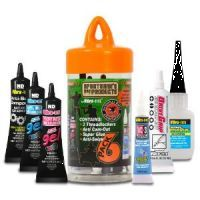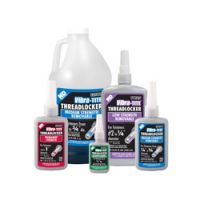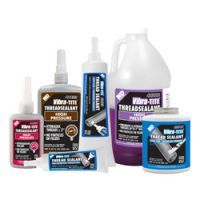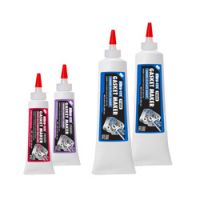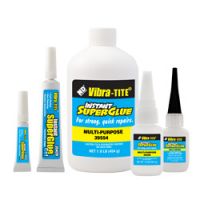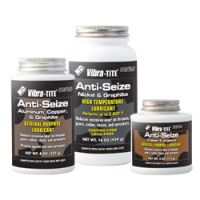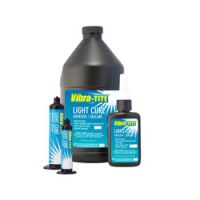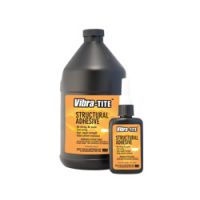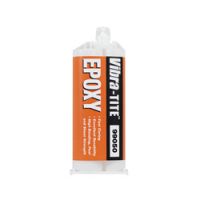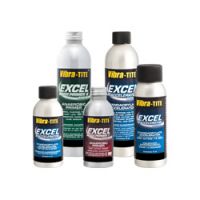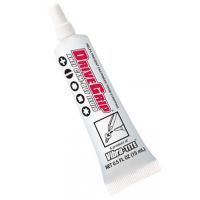
Jay-Cee Sales and Rivet offers a full line of Vibra-Tite® Threadlockers. Our selection of anaerobic Threadlockers are available in low strength, medium strength, oil tolerant, permanent strength, hight temp, and high strength.
Threadlocker
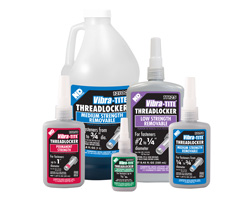
Threadlocker is a thin, single-component adhesive, applied to the threads of fasteners such as screws and bolts to prevent loosening, leakage, and corrosion. Typically, Threadlockers are methacrylate-based, and cure anaerobically. Threadlocker is a thixotropic fluid, meaning that under shear stress, it exhibits a time-dependent decrease in viscosity. This allows it to flow well over time, yet still resist short-duration shearing, as in vibration or shock.
Threadlockers may be applied either before or after assembly, depending on the type. Threadlockers are available in "permanent" and "removable" formulas, with heavy-duty permanent Threadlockers rated to withstand as much as 3,000 psi (21 MPa) in shear. Some Threadlockers are removable with the application of heat. Because Threadlockering adhesives typically rely on the electrochemical activity of a metal substrate in order to form a bond, substrates often require thorough cleaning, and, in the case of less electrochemically active metals such as aluminum, priming.
Because electrochemical activity is one of the two triggers that cause polymerization of the Threadlocker fluid, care must be taken to avoid contaminating the entire container of Threadlocker with Threadlocker that has had contact with metal, otherwise the material in the container may polymerize.
Threadlocker is typically sold in small containers, in amounts from 5 millilitres (about one teaspoon) to 250 millilitres (8.5 US fl oz), and are often color-coded to indicate their strength. Threadlocker is also sold in sticks, and in tape form, similar to Teflon tape.
Lock washers, locknuts, and safety wires may be used in conjunction with Threadlocker to prevent loosening bolts.
| Type | Typical color-code | Torque to break free | Torque to continue turning | Temperature range |
|---|---|---|---|---|
| Low strength | purple | 62 in-lb (7 N-m) | 27 in-lb (3 N-m) | -54 to 149 °C |
| Medium strength | blue | 115 in-lb (12 N-m) | 53 in-lb (6 N-m) | -54 to 149 °C |
| Medium strength surface insensitive | blue | 180 in-lb (20 N-m) | 62 in-lb (7 N-m) | -54 to 149 °C |
| High strength | red | 230 in-lb (25 N-m) | 225 in-lb (25 N-m) | -54 to 149 °C |
| High temperature | red | 180 in-lb (20 N-m) | 270 in-lb (30 N-m) | -54 to 232 °C |
| Penetrating | green | 90 in-lb (10 N-m) | 310 in-lb (35 N-m) | -54 to 149 °C |
Full Selection Of Vibra-Tite Products
|
|
|
|
|
|
|
|
|
|
|
|
|
|
|
|
|
|
|
|
|
|
Threadlocker is a thin, single-component adhesive, applied to the threads of fasteners such as screws and bolts to prevent loosening, leakage, and corrosion. Typically, Threadlockers are methacrylate-based, and cure anaerobically. Threadlocker is a thixotropic fluid, meaning that under shear stress, it exhibits a time-dependent decrease in viscosity. This allows it to flow well over time, yet still resist short-duration shearing, as in vibration or shock.
Threadlockers may be applied either before or after assembly, depending on the type. Threadlockers are available in "permanent" and "removable" formulas, with heavy-duty permanent Threadlockers rated to withstand as much as 3,000 psi (21 MPa) in shear. Some Threadlockers are removable with the application of heat. Because Threadlockering adhesives typically rely on the electrochemical activity of a metal substrate in order to form a bond, substrates often require thorough cleaning, and, in the case of less electrochemically active metals such as aluminum, priming.
Because electrochemical activity is one of the two triggers that cause polymerization of the Threadlocker fluid, care must be taken to avoid contaminating the entire container of Threadlocker with Threadlocker that has had contact with metal, otherwise the material in the container may polymerize.
Threadlocker is typically sold in small containers, in amounts from 5 millilitres (about one teaspoon) to 250 millilitres (8.5 US fl oz), and are often color-coded to indicate their strength. Threadlocker is also sold in sticks, and in tape form, similar to Teflon tape.
Lock washers, locknuts, and safety wires may be used in conjunction with Threadlocker to prevent loosening bolts.


